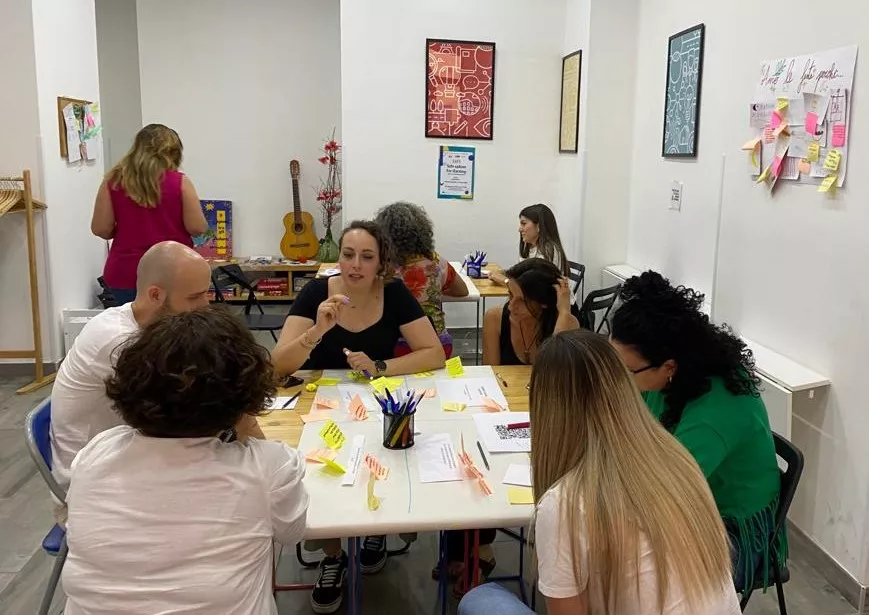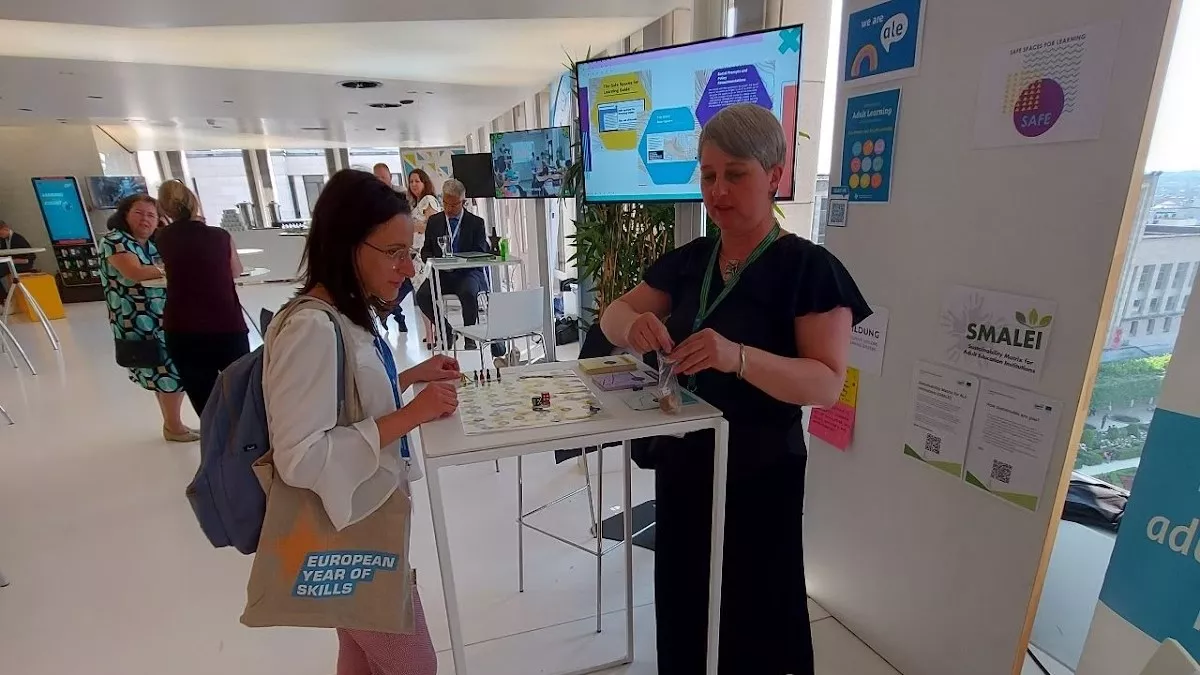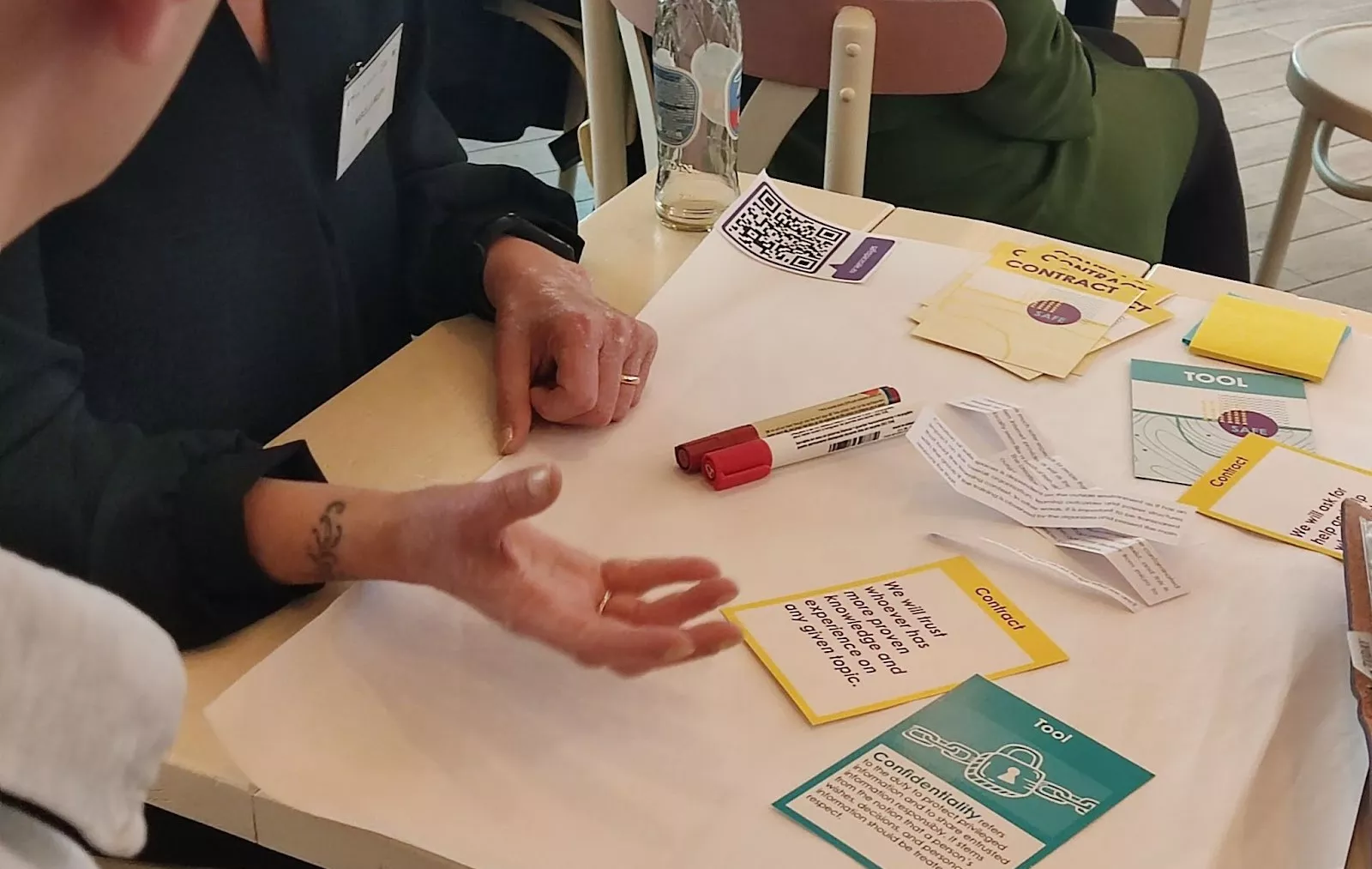Safe Spaces in adult learning: Creating change with a board game

When the SAFE project team got together we knew that we wanted to explore how systemic structures in our societies make us unsafe and find ways to create open and actual and holistic safe spaces in adult education. To do so we found that our liberating way through was to create our very own board game!
The ERASMUS+ project SAFE-Safe spAces For lEarning, coordinated by EPATV from Portugal is running for almost three years now with partners from all over Europe, and more specifically, VHS Vienna, from Austria, DAFNI KEK from Greece, Patatrac from Italy along with the EAEA- European Association for the Education of Adults from Belgium representing the European perspective and the ICAE- International Council for Adult Education from Serbia tackling global developments.
Understanding what safe spaces are for us
To start with understanding what safe spaces are for us we agreed that we had to get together with our communities, as only when we come together we shape and maintain our safe spaces. The most essential of our findings through the process of the discussions with our focus groups was that safe spaces for us are our relations, our discussions and our places where we come together and communicate regarding our experience with marginalisation, learn, and engage in social and political matters against repression, and as such, this is our definition:
A safe learning space is a space which, either technically or emotionally, is meant to provide equal opportunities, representation and communication outlets for marginalised groups or persons in an environment of respect and understanding that eliminate oppressive behaviours, recognise the struggle and cultivates dialogue.
The concept of "safe space" that we use derives from the 1970s women’s, LGBT and racial movements and was originally used to name physical meeting places where like-minded people could meet and share their experiences in a safe environment. In adult education the concept of safe space concerns how learners and educators together recognise patterns that come through systemic exclusion due to gender, sexuality, race or their socio-economic status, and strive to create honestly diverse communities.
Creating the SAFE Board Game
When designing our game we wanted all these ideas to be visible. To do that we decided that the goal of our boardgame would have to be the creation of a social contract between the players and their self, their learning community and their societies.
To do that we agreed that the players could either play the game as themselves or as characters that are randomly assigned to them, by luck and the use of a dice. In both and any case, though we agreed that in this game, no one can win if even one stays behind!
To navigate the SAFE board the group will have to overcome challenges and reflect on why they do or do not face them, use tools to help their community and choose imperatives to include in their social contract.
To help us create our challenges, tools and imperatives for the social contract we had to bring together the entire ALE community, and we are happy to say we did it!

Figure 1: Group meeting on co-creating the SAFE Boardgame, organised by Patatrac in Aversa, Italy
Through our first piloting phase we were happy to welcome the very enthusiastic participation of diverse groups of adult learners, educators, and policymakers, and gather their actual statements which one can now find in the cards of our board game!
During the piloting sessions, participants engaged in discussions, challenging biases, and sharing their experiences related to privilege and struggle. We were especially happy to see that our board game successfully facilitated open dialogue, allowing participants to recognize and address systemic marginalization and normalized oppression, even when we least expected it. When we asked our participants for feedback we concentrated our efforts to understand how to enhance the game's mechanics, content, and overall educational value in order to make the players even more engaged.

Figure 2: Discussing and playing with the elements of the game at EAEA's kiosk during the Making Skills Count Conference in Brussels, Belgium
As the SAFE board game continues to evolve, incorporating the valuable feedback received during the piloting phase, it promises to be a powerful tool for creating change in adult education.
The first piloting phase marked a significant milestone in the SAFE project's journey, reaffirming the importance of safe spaces and the transformative potential of the board game.
And now we play…
After the first piloting phase we went back to work. And after many tries, we now have in hands our final version of the SAFE Board Game. And what do we do when we have a board game? We start playing!
Already several partners have started playing the game with the people that helped us create it as well as with their networks of learners, educators or policymakers.
The participants expressed an invaluable appreciation for the game's ability to create a safe and inclusive learning environment, where everyone's voice was valued and respected. Our participants also mentioned that the game encouraged them to examine their own biases and privilege, leading to a heightened awareness of the importance of safe spaces.
But as we have already maybe said too much, we’ll leave that to the people that played the game and some quotes we gathered so far…

Figure 3: Playing the game with policymakers and civil society stakeholders, organised by the EAEA in Brussels, Belgium
“We have to play the safe game between policymakers!”
“It really helps talking outside of your own self”
“Sometimes we do not understand how many challenges different people may face, not only because of their social status but because of their culture, character or experience. It becomes so much more visible through a game”
“ As educators, we really have to consider safety not only inside the classroom but also between us in an organisation. In my opinion, we would first have to play the boardgame between us and our management”
“This is a game that will keep on evolving. The fact that we can be independent on using only the cards, or only some of them, using only the board and the scenarios, being flexible, is the actual added value”
“I liked that we talked about important things without a lecture about them”
Conclusion
As part of the adult education community, we have an uncontested right and obligation to reflect on the ways and the motivations on which we act. We need to more essentially represent the wealth of processes we have created in order to break the cycles of bias, oppression and discrimination and realise that safe, open and welcoming spaces are powerful and essential.
You can access the online version of the SAFE Board Game through the project's website or request a printed version by contacting the EAEA and Angeliki Giannakopoulou at angeliki@eaea.org.
You may also take a look at the rest of the project results here:
1.IO1- Safe Spaces for Learning Guide: How to create and maintain a safe space for adult learning.
--IO1. A.1: Safe Spaces in everyday life: The Why, the What, the Who the Where and the How.
2. IO2: The S.A.F.E. Boardgame: Recognise Bias and Create a Safe Space
3. IO3: Policy Paper: Sustaining Safe Space Mentalities
Related Resources in EPALE
Representing community mobilisation on film: learning through and about movements and their struggles: https://epale.ec.europa.eu/en/resource-centre/content/representing-community-mobilisation-film-learning-through-and-about
Support on how to integrate Diversity and Social Inclusion: https://epale.ec.europa.eu/en/resource-centre/content/support-how-integrate-diversity-and-social-inclusion
Elizabeth Harrin: Vulnerability and sharing in the digital space: https://epale.ec.europa.eu/en/blog/elizabeth-harrin-vulnerability-and-sharing-digital-space
Handbook: FOSTERING INCLUSIVE LEARNING ENVIRONMENTS THROUGH CULTURAL HERITAGE: https://epale.ec.europa.eu/en/resource-centre/content/handbook-fostering-inclusive-learning-environments-through-cultural
New issue of the International Review of Education celebrates Freire: https://epale.ec.europa.eu/en/resource-centre/content/new-issue-international-review-education-celebrates-freire
Understanding Racism – Defining Racism in an Irish Context: https://epale.ec.europa.eu/en/resource-centre/content/understanding-racism-defining-racism-irish-context
Scarcity, ‘polite society’ and activism: https://epale.ec.europa.eu/en/resource-centre/content/scarcity-polite-society-and-activism
EPALE Community Conference 2021 - Workshop: Diversity and safe space in adult learning: checking our privilege: https://epale.ec.europa.eu/en/blog/epale-community-conference-2021-workshop-diversity-and-safe-space-adult-learning-checking-our




